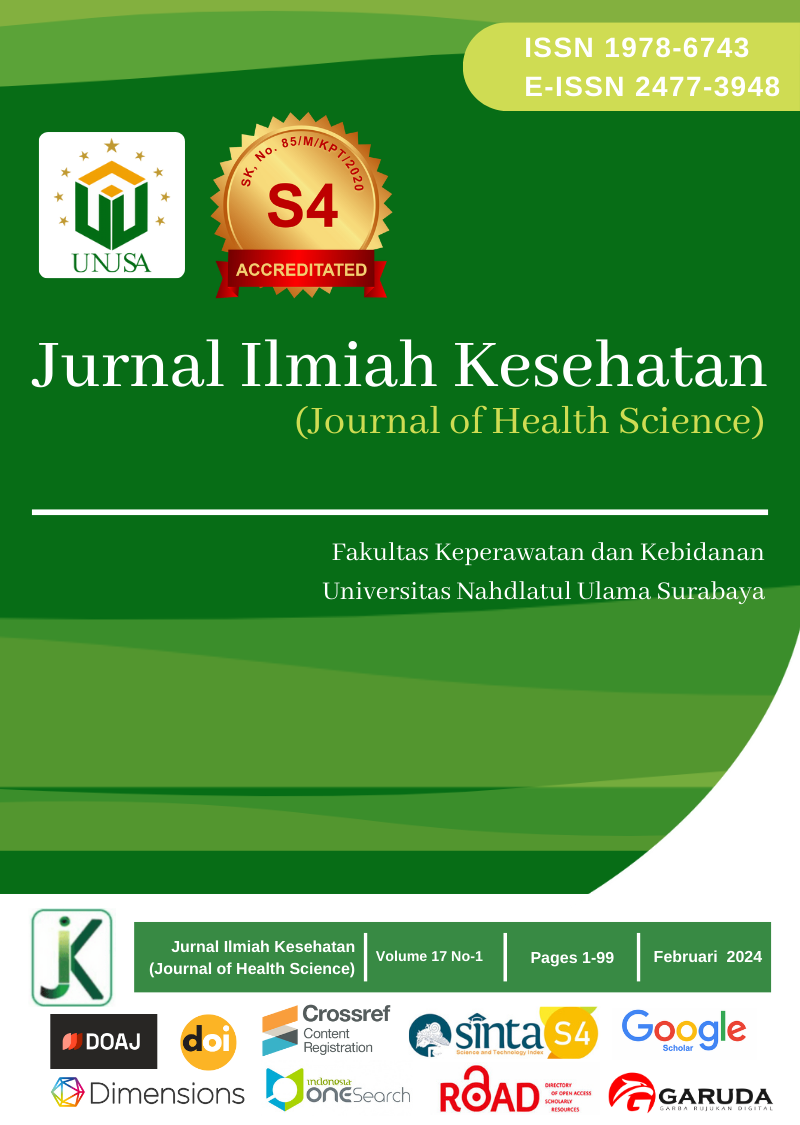The Effect of Giving Cinnamon Decoction Water on The Healing of Perineal Wounds of Postpartum Women at Sri Wahyuni’s PMB and Erlia Saraswati’s PMB
Main Article Content
Abstract
The puerperium is a sensitive time for mothers because they must care for themselves while recovering after giving birth and caring for their babies. So, a good and effective postpartum healing process can help the mother get through the puerperium. Perineal infection is a common infection in mothers after giving birth. Some literature shows that cinnamon has ingredients that can heal wounds. This study aims to see how the influence of cinnamon cooking water on the healing of perineal wounds in postpartum women. This quantitative study used a quasi-experimental design and a nonequivalent control group design approach. The population in this study were postpartum women who gave birth in March and April 2023, respectively. Using a purposive sampling approach, 60 respondents were selected and were divided into two groups. Observation sheets and checklists were used to collect data. Wilcoxon Signed Rank Test, and Mann Whitney U Test was used to analyze the data. The results showed that the average perineal wound healing in the control group was 1.60, while the average in the intervention group was 1.87. The Wilcoxon Sign Ranked Test results obtained a p-value (0.000), namely <0.05, which means there was a difference in wound healing before and after being given treatment for each group. Then, the results of the Mann-Whitney U Test obtained a p-value (0.021) <0.05, meaning there was a difference in wound healing between the treatment and control groups. So, the conclusion that can be made in this study is that giving cinnamon-boiled water affects the healing of perineal wounds in postpartum mothers.
Downloads
Article Details
Copyright (c) 2024 Nely, Ani Media Harumi, Sukesi, Sherly Jeniawaty

This work is licensed under a Creative Commons Attribution-ShareAlike 4.0 International License.
References
Christiani, M. and Pane, H.W. (2023) ‘Effect of kersen (muntingia calabura l) leaf decoction on perineal
wound healing in postpartum women at Murniati Clinic Kisaran’
, Science Midwifery, 11(3), pp.
–568.
D’Souza, J.C. (2020) ‘An evaluation of the risk factors associated With sustaining perineal trauma At
childbirth, subsequent birthing outcomes and the effects on pelvic floor dysfunction’. University
of Southampton.
Darukshan, A. and Grover, A. (2022) ‘Episiotomy Site Infection’, in Infections and Pregnancy. Springer, DOI: https://doi.org/10.1007/978-981-16-7865-3_34
pp. 535–546.
Girsang, B.M. and Elfira, E. (2023) ‘A Literature Review on Postpartum Perineal Wound Care:
Epidemiology, Impact, and Future Interventions’
, Open Access Macedonian Journal of Medical
Sciences, 11(F), pp. 73–80.
Hajimonfarednejad, M. et al. (2019) ‘Cinnamon: A systematic review of adverse events’ DOI: https://doi.org/10.1016/j.clnu.2018.03.013
, Clinical
Nutrition, 38(2), pp. 594–602.
Khan, M.S.A. and Ahmad, I. (2019) ‘Herbal medicine: current trends and future prospects’, in New look
to phytomedicine. Elsevier, pp. 3–13.
Mukherjee, P.K. (2019) Quality control and evaluation of herbal drugs: Evaluating natural products and DOI: https://doi.org/10.1016/B978-0-12-813374-3.00016-8
traditional medicine. Elsevier.
Rodrigues, M. et al. (2019) ‘Wound healing: a cellular perspective’ DOI: https://doi.org/10.1152/physrev.00067.2017
, Physiological reviews, 99(1), pp.
–706.
Saggar, S. et al. (2022) ‘Traditional and herbal medicines: opportunities and challenges’ DOI: https://doi.org/10.5530/pres.14.2.15
, Pharmacognosy
Research, 14(2).
Slullitel, P.A. et al. (2020) ‘Is there a role for preclosure dilute betadine irrigation in the prevention of DOI: https://doi.org/10.1016/j.arth.2019.12.035
postoperative infection following total joint arthroplasty?’
, The Journal of Arthroplasty, 35(5), pp.
–1378.





